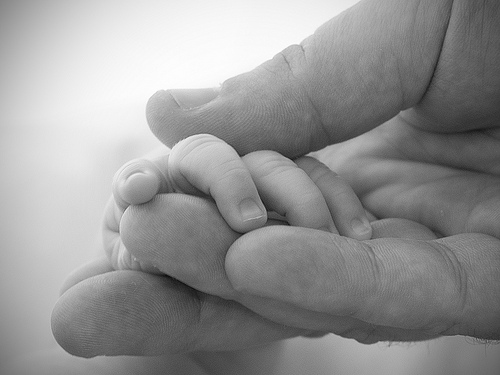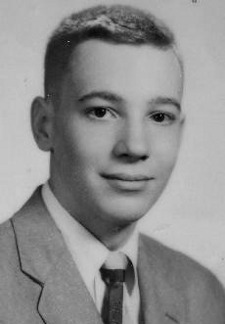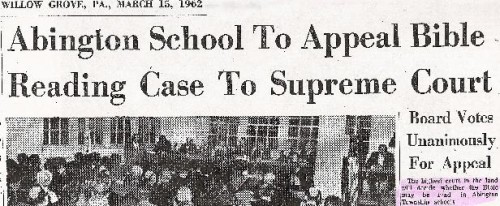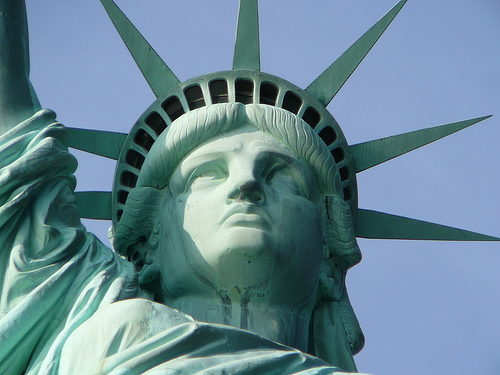Before I begin this week’s topic, I would like to acknowledge that today is Father’s Day. As with Motherhood, becoming a father is transformative and the beginning of a life-long journey. A very happy Father’s Day to all that walk that path offering a piece of themselves to the next generation.

Courtesy of Flickr’s fruity monkey
Now back to our regularly scheduled program….
Tomorrow is the 50th Anniversary of the SCOTUS ruling on the Abington School District, Pennsylvania vs.Schempp case. What’s that? This 1963 Supreme Court case is considered to be a major historical marker in the on-going struggle to affirm religious equality within American public schools. The Schempp ruling was an indicator of a coming cultural revolution and an acknowledgement of America’s diverse religious tapestry.
In 1956 Ellery Schempp, a 16-year-old student at Abington High School, became increasingly frustrated with the school and state policy that required students to read daily Bible passages in home room. Ellery and his family were Unitarian Universalists and minorities in their Pennsylvania community. The Bible readings conflicted with their personal religious beliefs.

Ellery Schempp
One day in protest Ellery stood up and read from the Qur’an. He was immediately sent to the Principal’s office and disciplined. But the story doesn’t end there. With the help of his father and the ACLU of Pennsylvania (then Philadelphia), Ellery sued the Abington school district. The case worked its way up through the courts. It was eventually merged with another similar and more famous case involving the controversial Madalyn Murray O’Hair, an Atheist activist and founder of American Atheists.
Finally, the Schempp case reached the Supreme Court of the United States (SCOTUS). On June 17, 1963 the Court declared it unconstitutional for public schools to require mandatory Bible recitation and other similar religious activities:
Because of the prohibition of the First Amendment against the enactment by Congress of any law “respecting an establishment of religion,” which is made applicable to the States by the Fourteenth Amendment, no state law or school board may require that passages from the Bible be read or that the Lord’s Prayer be recited in the public schools of a State at the beginning of each school day — even if individual students may be excused from attending or participating in such exercises upon written request of their parents. (from Cornell Law School)
Pennsylvania and several other states had to immediately “scrap” the laws that mandated student participation in religious recitation activities.
The Schempp case set a legal and cultural precedent that upended the widely-accepted place of religion in public education. But it was not the first case of its kind. In an interview with Americans United for the Separation of Church and State, First Amendment Scholar Steven K. Green said:
…as we mark the anniversary of these seminal decisions, we should acknowledge that they were not cases of first instance; rather, they built on a long-developing body of jurisprudence that was affirming the centrality of religious equality and church-state separation to our nation’s democratic system.
In the brief interview, Green discusses America’s historical battle for religious equality within public education. The earliest cases were brought to trial by Catholics who didn’t want their children reading Protestant-based Bible passages or prayers. In 1869, Ohio became the very first state to officially declare unconstitutional the practice of forced Bible recitation in public schools.
As the American population became more religiously diverse, the issue evolved beyond a Catholic- Protestant polarity. The Schempp case exposed the reality of religious diversity in the United States and opened up a new dialog concerning the separation of church and state. And it did so as the country began to experience a dramatic social change.

Since the 1963 ruling there have been countless protests, backlash and legal maneuvers on all levels to bring school-sponsored prayer back into the classroom. In the early 1980s former President Ronald Reagan proposed a new constitutional amendment that would officially allow voluntary public school prayer. It failed to pass. Green says:
So long as lawmakers believe they can gain mileage by manipulating the school prayer issue, then there will be no end to prayer and Bible reading proposals. These efforts are cynical as they play on fears and misperceptions among religious conservatives about the Supreme Court’s holdings. Students enjoy many freedoms of religious expression in schools, but enforced religiosity is not a cure for society’s ills.
Here at The Wild Hunt we have and will continue to report on any such school cases that directly involve Pagans and Heathens (e.g. the Buncombe County situation in 2012). However, all such cases are pertinent to all parents with school-age kids. Legislative policies affect every child – not just the one whose parents spoke up. What is going on in my school district? What are my state’s policies on religion in public school? Rev. Selena Fox, co-founder of Lady Liberty League, once said, “Having liberty and justice for all in this country may be in the Pledge of Allegiance, but it is not an automatic reality.”
Here are three very recent related cases:
- On June 1st in Liberty, South Carolina, Roy Costner IV paused his prepared and approved high school valedictorian speech to recite The Lord’s Prayer. He told the media that “This is what God wanted me to do.” The event was not school-sponsored. Therefore no disciplinary action is being taken against Roy or the school.
- On June 13th Texas Governor Rick Perry signed into law the so-called “Merry Christmas” Bill (H.B. 308). It protects the free expression of religion, through symbols or holiday greetings, regardless of faith within public school settings. To date the new law has provoked little opposition. The ACLU of Texas has declined to comment.
- On June 13th Americans United attorneys sent a letter to an Ohio school district warning them to keep creationism out of the school system. The Springboro district has planned to introduce controversial subjects such as global warming, gun rights, pro-life vs. abortion, and creationism vs. evolution. Rev. Barry W. Lynn, executive director of Americans United said, “Any public school contemplating teaching creationism might as well just hang up a giant banner that reads “Sue Us Now.”
There are many challenges out there and many that have yet to be addressed. Is it constitutional for religious organizations to hold services in school buildings on the weekends? What about school vouchers and the wording of the “Pledge of Allegiance”? Can religious clubs advertise and hold functions during school operating hours? Is it possible to teach religion historically in a secular format without crossing the constitutional line? These are some of the questions that pop up time after time.
As a way of honoring the 1963 SCOTUS decision, Pennsylvania’s legislature has declared June “Public School Religious Freedom Month.” While you go about your day tomorrow, take a moment to reflect on religious freedom in public education and the importance of the Establishment Clause in your own life.

Photo Courtesy of Flickr’s mksfly
The Schempp ruling paved the way for Pagans and Heathens to be able speak out and protect the rights of their growing children. It allowed for the birth and growth of groups like the Lady Liberty League who use their resources to protect the religious freedoms of Pagan children within the public school systems. Today our children are not forced to read The Lord’s Prayer. But perhaps more importantly, we can readily recognize the problem when and if it occurs and we have the language and backing of SCOTUS when we say “That’s wrong.”
The Wild Hunt is not responsible for links to external content.
To join a conversation on this post:
Visit our The Wild Hunt subreddit! Point your favorite browser to https://www.reddit.com/r/The_Wild_Hunt_News/, then click “JOIN”. Make sure to click the bell, too, to be notified of new articles posted to our subreddit.
I look forward to seeing what happens the first time a student or teacher wishes “Happy Solstice” “Merry Equinox” “Healthy Eid” “Bright Diwali” etc.
Wonder how long that “Merry Christmas” law will stand then? We saw how long non-school groups were allowed to send materials home in students backpacks as soon as an atheist camp sent theirs along with all the Christian camps.
I would expect the “Merry Christmas” law will stand with no trouble. It does not mandate speech, merely protects it.
It was already quite protected for students to wish others whatever they wished.
This is yet another “solution” in search of a problem.
I’m not surprised that our local “pagan conservative” would stand with the Christo-Fascists…not surprised at all… Keep on licking the hands of your “masters”.
You’re missing the point. This comes from a Texas conservative. Their agenda is always to push Christianity first but they use diversity and free speech as a cover. As soon as someone who is a minority comes along and tries to apply the law equally, it will be scrapped. This has always been the case. Don’t be so naïve.
He, like all Conservative “pagans”, always sides with the Christians. It’s pathological. I can just see him standing around after the Massacre of Verden, saying to the surviving Saxons, “Well, he DID tell us to convert, and he gave us multiple chances to comply, you know. You brought this on yourselves, trouble-makers.”
“Is it constitutional for religious organizations to hold services in school buildings on the weekends?”
-Yes, provided it is not mandatory, or exclusive, and is offered freely to other religious groups.
“What about school vouchers and the wording of the “Pledge of Allegiance”?”
– The wording of the Pledge of Allegiance should be altered back to its original, pre 1940’s state, in my opinion. However, there are already supreme court precedents making it non-compulsory. A student doesn’t have to speak or, even, stand for the pledge. And any institution forcing them to do this is in violation of those precedents and, thus, the First Amendment.
“Can religious clubs advertise and hold functions during school operating hours?”
– Yes, provided it is not mandatory, or exclusive, and is offered freely to other religious groups. The colleges in the SUNY system charge their students a mandatory student activity fee, which gets put into a pot used to fund college clubs. The Catholic student club, the Korean Bible Club, and the Pagan student club all drew from that same pot, and had to go through the same fundamental process of application.
” Is it possible to teach religion historically in a secular format without crossing the constitutional line?”
– Yes. College classes do this as part of certain kinds of Liberal Arts educations. My undergraduate college had two courses on the bible, that were taught in tandem by two different professors. One was the Bible as History, and the other was the Bible as Literature. The issue is when secondary school programs make it, again, a compulsory part of the educational process. These things should be available as electives. Why are college courses on Judaism and Buddhism and other interests regarded as innately secular, while courses on Christianity are seen as a tool of indoctrination?
It goes without saying that it is the Christian experience which causes so many people to believe that there is to be no religion in public education of any sort. Because the Christians do not like to share, or to play well with others, they’ve perpetuated misinformation about taking ALL forms of religion out of the secular and erecting these enormous barriers. Which has, of course, been picked up by anti-Christians, anti-theists, and atheists all alike.
I was involved in a spat on Facebook (yeah, good use of my time, I know) where posters were complaining about the idea of a dedicated period of prayer in a school to help make considerations for the Muslim population. Cue the typical “no religion in the schools!” or “I should have time to pray” arguments. Funny how nobody commented to me when I said that the entire Western secular business week is set up around the idea of the Christian day of rest and prayer (either Saturday or Sunday depending on your denomination), and that the schools aren’t even in session when they’re supposed to be in church, praying.
These issues are only issues when people take it upon themselves to force an agenda. I know it is asking too much of a perfect world to accept the kind of level playing field that I would expect from intelligent human beings. We have to remain vigilant about this kind of abuse.
Why are college courses on Judaism and Buddhism and other interests
regarded as innately secular, while courses on Christianity are seen as a
tool of indoctrination?
College isn’t the issue. Elementary school, middle school, and high school are – for one thing, because college isn’t compulsory.
I was speaking to attitudes about the courses. Electives exist in high school, as well.
Electives exist in high school, as well.
Not as such (and not at every school)…and high school is obligatory. If you are a high school student, you are required to attend. You cannot decide to leave, and you do not always have a choice of which ‘elective’ you must take (my oldest daughter graduated last year. I have lots of current experience with public high school and its ‘choices’.)
Frankly, high school is fraught enough without adding religion (which – by the by – parents should be teaching, not the schools).
Why is it bad to learn about (other) religions?
So long as it is taught in humanities and not science, there shouldn’t be an issue.
I took three courses on the Bible at the University of California at
Berkeley, a state school which does not have a religion department. I
took the (Hebrew) Bible as LIterature and the (Hebrew) Bible as History
in the Near Eastern Studies Department, and the Synoptic Gospels, I
don’t remember which department taught that. All three courses were
taught with reasonable scholarly objectivity and no ax to grind, and I
got a lot out of them. This was quite a while ago and the other students
were not disruptive; they understood the difference between higher
education at a public university and religious indoctrination.
Teaching
courses like that in a public grade school would be much more
difficult. Neither the students nor their parents would allow the
teacher to convey the facts without taking some religious position.
I
remember when “under God” was added to the Pledge of Allegiance, even
though I was a young child at the time, and it gripes me to this day.
Religious statements have no place in a pledge to a republic, and
besides, that little phrase spoiled the scansion of “one nation
indivisible” by dividing it.
Re the Pledge:
Yes. But like I said, it’s been a supreme court decision since 2006 that the student is not required to say the pledge, or even stand. To force someone to recite a pledge of allegiance is in violation of their right to Free Speech (or their right lack there of). A forced pledge of allegiance has no place in a republic, that is a tool for fascism.
Actually I believe there are SCOTUS decisions going back to the Forties saying you can’t be penalized for refusing to say the Pledge. I believe a Jehovah’s Witness sued, on the grounds that it’s idolatrous.
At my elementary school in the Fifties, we started every day with the Pledge, singing of one of half a dozen patriotic songs (America the Beautiful, My Country ‘Tis of Thee, etc.), group recitation of the Lord’s Prayer, and listening to a short Bible reading by the teacher. I had no objection to the Pledge (except the under God bit) and the songs, and still do not. There is beautiful poetry in some of those songs. I always understood the words of the pledge to be aspirational: we don’t have liberty and justice for all, but that’s what we strive for. Learning the songs of one’s nation is not fascism. But no one who does have an objection should be forced to do it.
A Bible as history course? I hope there weren’t too many religious kids there, historians and archaeologists have been tearing apart any claims of historicity for the past few decades. It almost makes me feel bad, because kids who have been told their whole life the Bible is historically accurate go from that to the opposite very quick.
I like the literature ones though, I nearly took an elective like that in high school. Then I saw who was teaching it an decided I’d prefer not to be expelled for challenging and overtly religious teacher in a conservative county. But I have heard other schools have managed to do it well.
This was circa 1969. All three classes addressed when the various books were written and the points of view they espoused. The Bible as Literature course sorted out the different genres of literature collected in the Bible, which is an absolute necessity if you want to get anything out of it. It didn’t get into comparisons with the literature of other cultures that influenced the forms, but UC was on a quarter system in those days and there’s only so much material you can cover in ten or twelve weeks.
From the History course I mainly remember Kings and Chronicles, which contain actual historical information about the kings of Israel and Judah along with legendary material and political arguments. We didn’t get into much discussion about the historicity of David and Solomon. Anything earlier than the kingdom period, IMO there’s not enough archaeological evidence to settle an argument.
I think the main difference today would be that a college course on the Synoptic Gospels would include Thomas; we only read Matthew, Mark and Luke.
I was a religious kid in the sense that I wanted to revisit the stuff I had been taught in Sunday School from a more detached and adult POV, and I was curious about the Christian sacred literature (which I had not read a word of before taking the Gospel course).
Hmm honestly for 1969 that sounds very professional, even from the history side (and many of the developments I can think of occurred after that date, Biblical Archaeologist still more or less controlled the field then).
This is a little off topic and you might not remember but I’m just curious, did you discuss the Omride dynasty and how did they treat them if you did (and if you remember?). That’s been a big sticking point between Biblically based scholars and academic ones.
Christianity is still essentially institutionalized at most schools (certainly the ones I attended), but these rulings were still hugely important. It could have been so much worse. Instead of minor insults like having pagan sites blocked (in the category with Nazis and hate speech no less) and allowing favoritism for Christian groups and Christian messages (the principal allowed some far-right a**hole to publish an anti-gay marriage tract, complete with “you could marry a lamp next!” and other lies in the school paper. He had to approve it being published. He offered no time for other opinions, or any non-Christian viewpoint), and protecting teachers that proselytized on the school campus, I could have been forced to read a Bible every morning or expelled.